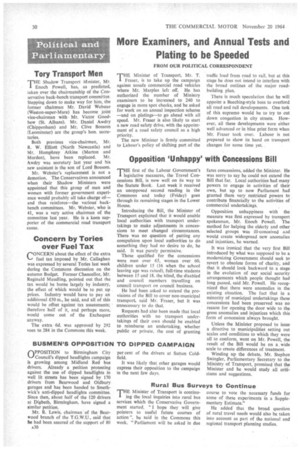Opposition 'Unhappy' with Concessions Bill
Page 32

If you've noticed an error in this article please click here to report it so we can fix it.
THE first of the Labour Government's legislative measures, the Travel Concessions Bill, is now well on its way to the Statute Book. Last week it received an unopposed second reading in the Commons and today (Friday) goes through its remaining stages in the Lower House.
Introducing the Bill, the Minister of Transport explained that it would enable local authorities with transport undertakings to make adjustments in concessions to meet changed circumstances. There was no question of putting any compulsion upon local authorities to do something they had no desire to do, he said. It was purely permissive.
Those qualified for the concessions were men over 65, women over 60, children under 15 (16 when the school leaving age was raised), full-time students between 15 and 18. the blind, the disabled and council members travelling on council transport on council business.
He had been asked to extend the provisions of the Bill to cover non-municipal transport, said Mr. Fraser, but it was unnecessary to do that.
Requests had also been made that local authorities with no transport undertakings of their own should be enabled to reimburse an undertaking, whether public or private, the cost of granting fares concessions, added the Minister. He was sorry to say he could not extend the Bill that far. Local authorities had many powers to engage in activities of their own, but up to now Parliament had granted them very restricted powers to contribute financially to the activities of commercial undertakings.
Opposition unhappiness with the measure was first expressed by transport spokesman, Mr. Enoch Powell. The method for helping the elderly and other selected groups was ill-conceived ad would create widespread new anomalies and injustices, he warned.
It was ironical that the very first Bill introduced by what was supposed to be a modernizing Government should seek to revert to obsolete forms of charity, and that it should look backward to a stage in the evolution of our social security arrangements which people thought had long passed, said Mr. Powell. He recognized that there were anomalies in the existing situation. The fact that in a minority of municipal undertakings these concessions had been preserved was no reason for opening the door wide to the gross anomalies and injustices which this form of concession always brought.
Unless the Minister proposed to issue a directive to municipalities setting out scales and conditions to which they were all to conform, went on Mr. Powell, the result of the Bill would be on a, wide scale to create differences of treatment,
Winding up the debate, Mr. Stephen Swingler, Parliamentary Secretary to the Ministry of Transport, promised that the Minister and he would study all criticisms and suggestions.




















































































































